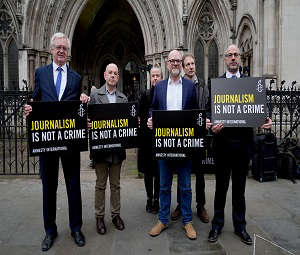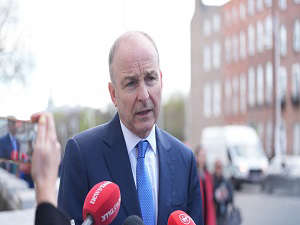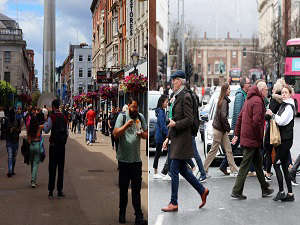
By David Young (PA)
A covert surveillance operation authorised by a Northern Ireland police chief in a bid to unmask a journalistic source was unlawful, a tribunal has ruled.
The Investigatory Powers Tribunal quashed the decision made by former Police Service of Northern Ireland chief constable Sir George Hamilton, to approve the Directed Surveillance Authorisation (DSA) in an investigation into the leaking of a confidential document that appeared in a documentary on a Troubles massacre.
The tribunal, chaired by Lord Justice Singh, also awarded damages of £4,000 each to documentary makers Barry McCaffrey and Trevor Birney, in a judgment issued on Tuesday.
The IPT had been examining allegations that the award-winning journalists were subject to unlawful covert surveillance by UK authorities.
The tribunal also looked at separate allegations that the PSNI and the Metropolitan Police in London unlawfully accessed Mr McCaffrey’s phone data in unrelated operations, in 2013 and 2012 respectively.
The two forces had already conceded that those 2012 and 2013 operations were unlawful.
The tribunal also quashed the two authorisations for those two phone data operations, but did not award any damages to Mr McCaffrey in those cases.
In 2018, Belfast-based Mr McCaffrey and Mr Birney were controversially arrested as part of a police investigation into the alleged leaking of a confidential document that appeared in a documentary they made on the 1994 loyalist paramilitary massacre in Loughinisland, Co Down.
The Police Service of Northern Ireland (PSNI), citing a conflict of interest, asked Durham Police to lead the investigation into the inclusion of the Police Ombudsman for Northern Ireland document in the No Stone Unturned film on the UVF pub shooting that claimed the lives of six men.
The PSNI later unreservedly apologised for the way the men had been treated and agreed to pay £875,000 in damages to the journalists and the film company behind the documentary.
The settlement came after a court ruled that the warrants used by police to search the journalists’ homes and Fine Point Films had been “inappropriate”.
In 2019, Mr Birney and Mr McCaffrey lodged a complaint with the IPT asking it to establish whether there had been any unlawful surveillance of them.
In court proceedings earlier this year, the tribunal heard that a detective requested the DSA from Sir George in order to monitor whether the two reporters would reach out to their source in the week after their initial release from custody.
Sir George gave the green light for the covert surveillance of an individual whom officers suspected of being the source of the leaked document from the Police Ombudsman’s office.
In its judgment, the IPT said: “The authorisation, and any conduct following from it, were unlawful because the Chief Constable did not consider whether there was an overriding public interest justifying interference with the integrity of a journalistic source.”
The tribunal added: “We will quash the DSA. We have determined that a declaration of its unlawfulness would not be sufficient to afford the claimants just satisfaction in respect of its incompatibility with the rights protected by Article 10 (of the European Convention of Human Rights).”
Reacting to the judgment, Mr Birney and Mr McCaffrey both called for a public inquiry into police surveillance of journalists in Northern Ireland.
“This landmark ruling underscores the crucial importance of protecting press freedom and confidential journalistic sources,” said Mr Birney.
“We hope that the judgment today will protect and embolden other journalists pursuing stories that are in the public interest.
“The judgment serves as a warning that unlawful state surveillance targeting the media cannot and should not be justified by broad and vague police claims.
“The judgment raises serious concerns about police abuse of power and the law, and our case has exposed a lack of effective legal safeguards governing secret police operations.”
Mr Birney added: “Only a public inquiry can properly investigate the full extent of unlawful and systematic police spying operations targeting journalists, lawyers and human rights defenders in the north.”
Mr McCaffrey told reporters: “For this court to have found that a Chief Constable has acted unlawfully, we think is a major embarrassment, and it’s something that needs there to be a public inquiry.
“No other alternative – we need a public inquiry.”
Conservative MP David Davis, who has supported the journalists’ case, joined them at a press conference on Tuesday.
“This is the most dramatic and most far ranging decision I’ve ever heard from the Investigatory Powers Tribunal,” he said.
Mr Davis added his voice to the calls for a public inquiry.
“Because the UK Government is responsible for the Investigatory Powers Act and the Investigatory Powers Tribunal, it is for the Northern Ireland Secretary (Hilary Benn) to set up a public inquiry to make sure that this is dealt with properly.”
Responding to the judgment, current PSNI Chief Constable Jon Boutcher said he was committed to ensure his officers used the powers available to them in a way that was “lawful, proportionate and accountable”.
“I accept the Investigatory Powers Tribunal’s judgment that due consideration was not given to whether there was an overriding public interest in interfering with journalistic sources before authorising surveillance, which importantly, although it was not directed toward the journalists Mr McCaffrey and Mr Birney, it did impact them in 2018,” he said.
“This was one of a number of difficult decisions on a complex and fast-moving day for policing in Northern Ireland involving balancing competing interests at pace.
“Separately the Tribunal found that although officers complied with UK law and procedure at the time, a 2013 authorisation for communications data was a breach of our human rights obligations. I am pleased that the Tribunal found officers acted in good faith.
“Significant changes have already been made since these issues occurred, with the role of the Investigatory Powers Commissioners’ in authorising communications data requests and the Judicial Commissioners in cases involving those who handle confidential information.
“This is a detailed judgment and I will take time to consider and reflect on it and along with the findings of the McCullough Review (an ongoing independent probe into PSNI surveillance of journalists) in due course, to consider what further steps we can take.
“I am committed to ensuring that the Police Service of Northern Ireland use the powers available to us in a way that is lawful, proportionate and accountable.”

Journalists Barry McCaffrey (second left) and Trevor Birney (second right), with Conservative MP Sir David Davis (left) and supporters outside the Royal Courts of Justice.


 Taoiseach urges gardai and others to testify at Omagh bomb inquiry if asked
Taoiseach urges gardai and others to testify at Omagh bomb inquiry if asked
 James and Grace return as most popular baby names in Northern Ireland
James and Grace return as most popular baby names in Northern Ireland
 Omagh Bombing Inquiry reaches agreement with Irish Government over co-operation
Omagh Bombing Inquiry reaches agreement with Irish Government over co-operation
 Rory McIlroy’s career grand slam celebrated with Royal Mail postmark
Rory McIlroy’s career grand slam celebrated with Royal Mail postmark
 Economic and well-being gaps between Republic and Northern Ireland ‘widening’
Economic and well-being gaps between Republic and Northern Ireland ‘widening’